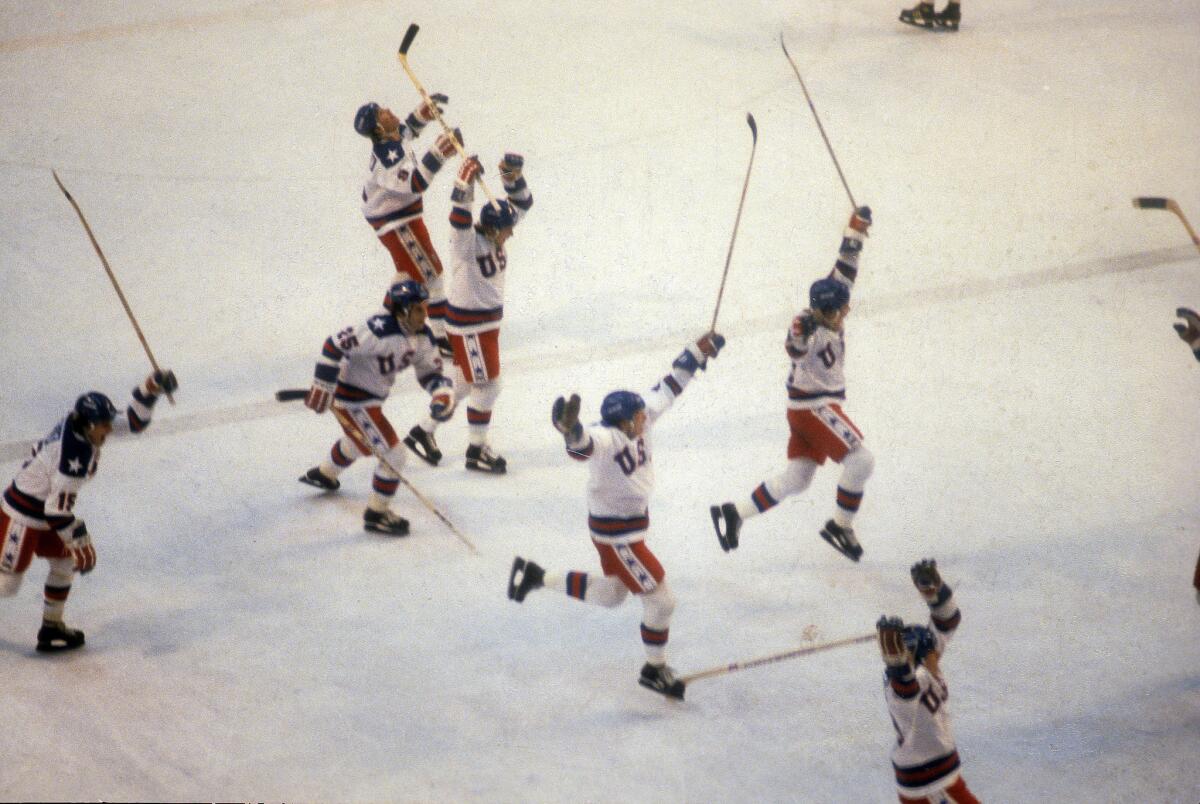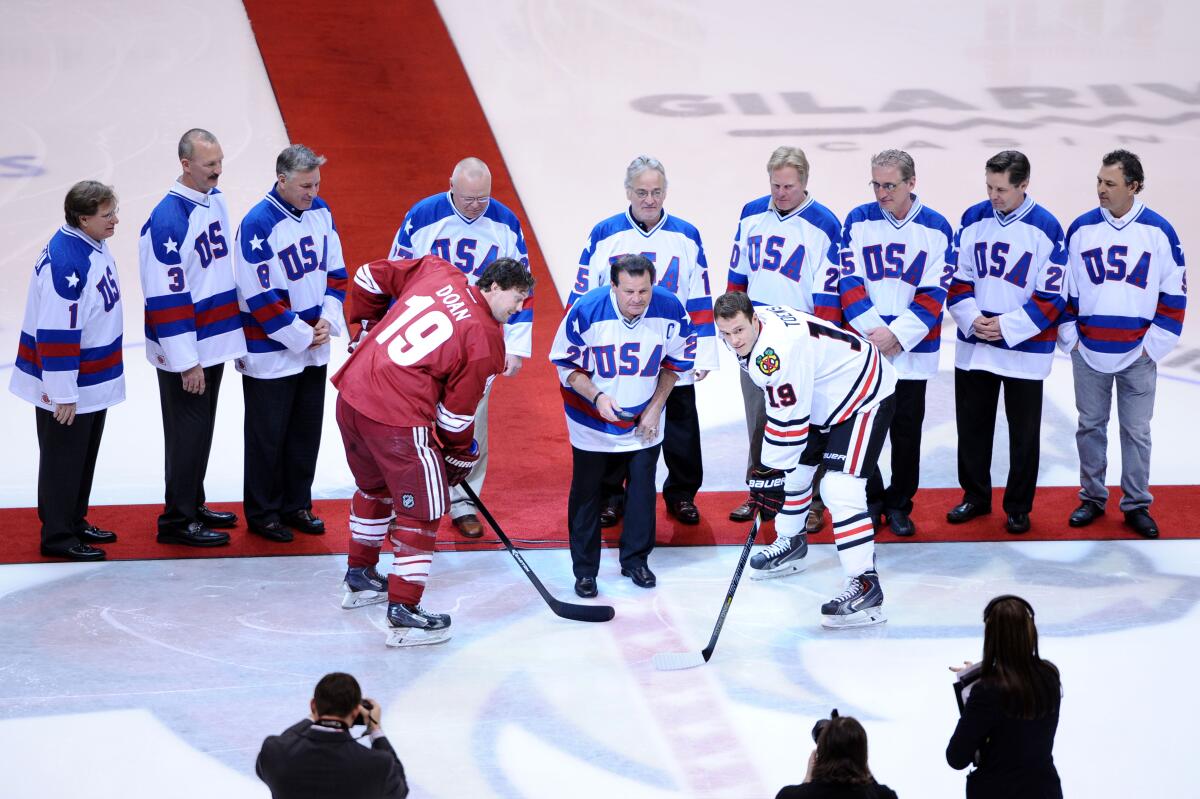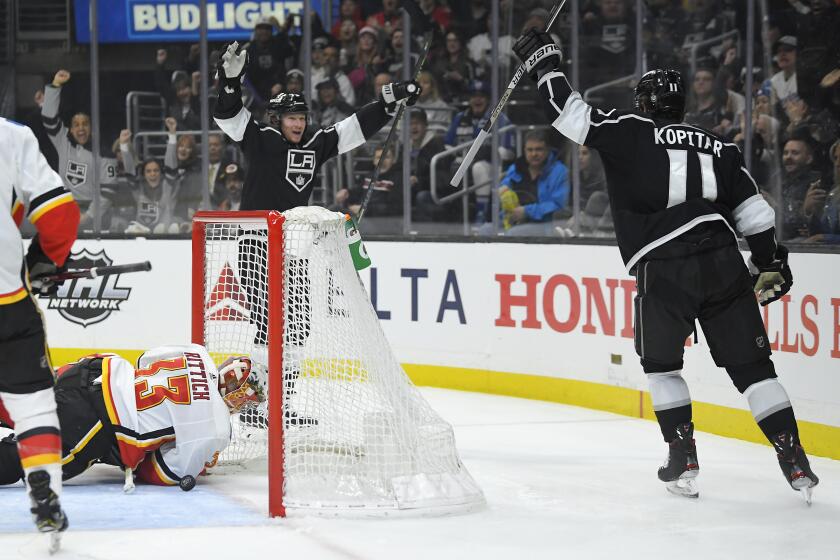Column: Forty years later, the ‘Miracle on Ice’ still doesn’t get old for Mike Eruzione and Al Michaels

- Share via
Forty years after Mike Eruzione helped transform a hockey game into a timeless tale about the power of teamwork in the face of impossible odds, four decades after Al Michaels’ spontaneous call during a tape-delayed telecast of the 1980 U.S. Olympic team’s stunning upset of the Soviet Union became one of the most celebrated phrases in sports history, their paths remain happily entwined.
Eruzione’s goal with 10 minutes left in the third period of an Olympic semifinal playoff against the mighty Soviets has been exhaustively written about, recreated on film and mythologized. Michaels was a junior member of what he called “the Mount Rushmore of broadcasting,” assigned to hockey play-by-play at Lake Placid, N.Y., because he had called one game at Sapporo in 1972, one more game’s experience than his colleagues had.
Eruzione’s game-winner and Michaels’ unrehearsed, half-question, half-declaration of “Do you believe in miracles? Yes!” as the clock wound down have taken on significance neither man could then imagine.
“I know I’ve been asked 100,000 times, ‘Do you ever get tired of talking about it?’” Michaels said. “And the answer is no, because people love to talk about it.”
Surviving members of the U.S. team will gather next week in Las Vegas to celebrate the 40th anniversary of their victory over the Soviets and gold-medal triumph over Finland two days later. Michaels sat for an interview with Mike Tirico in a show that will air on NBCSN on Wednesday.
Speaking on a conference call on Thursday, Eruzione and Michaels recalled the circumstances that made one goal, one team and one call life-changing experiences for them, for fans and for those who cared little about the sport then or now.
“For some, it was a hockey victory. For some, it was a political meaning, something as a country, for a shot in the arm,” Eruzione said, referring to Cold War political tensions and the Soviet Union’s then-recent invasion of Afghanistan. “I guess we brought a lot of pride back to a country that was looking for something, and it happened to be us.”
The Kings’ weeks-long scoring struggles finally subsided, as 12 players got on the scoresheet in a 5-3 victory over the Calgary Flames that ended the team’s losing streak at five games.
He’s still recognized in airports, asked to address teams and coaches in various sports, and in demand as a motivational speaker. He routinely meets people who were born after 1980 but know the story through their parents’ stories or the movies made about the team.
Eruzione was involved with the 1981 film “Miracle on Ice,” in which Karl Malden played coach Herb Brooks and Andrew Stevens portrayed Eruzione, but he had little connection with the better-known 2004 film “Miracle,” which featured Kurt Russell as an eerily accurate Brooks sound-alike and plaid pants dress-alike.
“I think my teammates and I have taken great pride in knowing we’ve kind of set a standard,” Eruzione said. “You believe in miracles, you believe in working hard, in sacrifice, and anything can happen.”
They were working-class kids who put aside their heated college rivalries and united in defiance of Brooks, their hard-driving coach. Brooks intended them to bond while he played the bad cop to the good cop played by Craig Patrick, the assistant general manager and assistant coach, and it worked.
He also intended them to win because of their skating and their conditioning and often told them, “The legs feed the wolf.” Brooks was right about that, too: the U.S. outscored its opponents 16-3 in the third period of its seven games at Lake Placid, including comebacks against the Soviets and in the finale against Finland.
Michaels said ABC tried to persuade the Russian hockey federation to agree to move the game to 8 p.m. Eastern Time instead of the 5 p.m. game that was planned as a delayed-tape broadcast. The Russians wouldn’t budge and the network didn’t want to air it live, believing not enough viewers would be home to watch.
Michaels also remembered walking to the game against the Soviets with analyst and former NHL goaltender Ken Dryden and discussing how they’d handle what loomed as a bad loss if the Americans’ 10-3 pre-Olympic exhibition loss two weeks earlier was any indication.
“The bottom line of the conversations was if it’s only 3-1 Soviets in the second period, maybe we can keep the audience,” Michaels said Thursday.
The Americans trailed by a goal three times but bounced back each time. Superbly skilled center Mark Johnson brought them even at 3-3 in the third period on a power-play goal, his second goal of the game, and Eruzione put them ahead at the 10-minute mark when he used a defenseman as a screen to score from the high slot — a goal similar to one he’d scored in that exhibition loss. The place went crazy, and the noise continued as the Soviets tried to score the equalizer.

Michaels also had the sounds of excited production staffers filling his ear and battled to concentrate.
“To think about what would be said at the end of the game or how it would be said never could enter my mind because the Soviets are putting pressure on. I’ve got to call it pass by pass, shot by shot,” he said. “And then just serendipitous, with six or seven seconds to go the puck comes out to center ice and the game is going to be over, the Soviets have no time to mount a last rush. The puck is in the neutral zone and the word that popped into my head is ‘miraculous.’ That’s just the word that popped in and it got morphed into a question and quick answer and away we went. All I’m trying to do at that point is call the game, don’t blow a call.…
“It was from my heart. It had nothing to do with what it meant to the country or anything beyond sports.”
It instantly became famous, but Eruzione didn’t hear the call until a few weeks later.
“It was awesome. I never thought it was a miracle, but it was a catchy phrase and it sounded right,” he said. “I thought Al’s best call, which I thought got lost in this whole thing, was, ‘This impossible dream comes true,’ when we beat Finland because this was a dream that we had as players.”
That dream became an everlasting example of what hope, hard work and preparation can do.
“It’s nice to know,” Eruzione said, “that people remember and share some great stories about what we did so long ago.”
More to Read
Go beyond the scoreboard
Get the latest on L.A.'s teams in the daily Sports Report newsletter.
You may occasionally receive promotional content from the Los Angeles Times.












